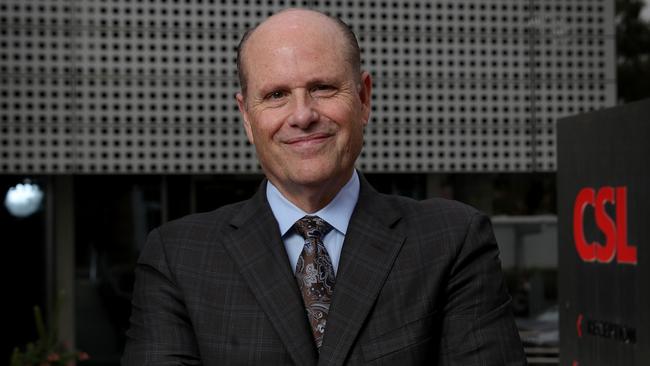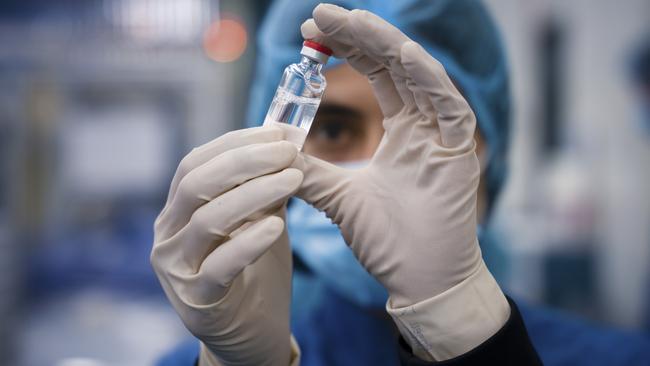CSL boss Paul Perreault dismisses Covid-19 and flu vaccine ‘super jab’ as misguided
CSL chief executive Paul Perreault says it will be a big ask and misguided to combine Covid-19 and influenza vaccines into a single super jab.

CSL chief executive Paul Perreault says it will be a big ask and misguided to combine Covid-19 and influenza vaccines into a single super jab, saying “we’re really smart people, but we’re not that smart”.
CSL, which ranks as one of the biggest companies on the ASX, is stepping up its investment in research and development, including “accelerating” its research into mRNA vaccines – the same technology used in the Pfizer and Moderna Covid jabs.
It comes as CSL’s vaccine business has given it a massive shot in the arm, with its flu jab business helping propel a 13 per cent lift in full-year profit to $US2.38bn ($3.28bn).
Chief executive Paul Perreault said the company was turbocharging investment in its vaccine business, which would help springboard its response to the Covid-19 pandemic.
And although he said the company had enough capability to develop and produce influenza and Covid vaccines, he doesn’t believe the two can be combined into a single shot.
This is contrary to rival Novavax, which said its combined flu and COVID-19 vaccine has produced functional antibodies against influenza and the coronavirus in a preclinical study.
“I think it’s a big ask,” Mr Perreault said.
“When you start mixing these viruses into a vaccine, it’s very difficult because the clinical trials will be very complex. How do you know what’s circulating, how do you know what the strains are doing? Does it have an impact from one strain into one of the other virus strains?
“It sounds really good but it’s going to be really hard to do. We’re really smart people but we’re not that smart. I’d say 10 years from now, maybe. But don’t assume that you can just throw anything into this and put it together. It’s a bit misguided.”
Revenue across CSL’s influenza vaccine business, Seqirus (pronounced “secure us”), surged more than 30 per cent to $US1.55bn as more people look to safeguard their health during the pandemic. Overall group revenue jumped 13 per cent to $US9.98bn.

For Mr Perreault it was vindication of his decision to buy Novartis’ global influenza business for $US275m in 2015, forming Seqirus.
“People were like ‘what are you doing? You know this is never gonna work’. But they‘ve contributed significantly this past year and they’ll contribute again this year,” Mr Perreault said.
“We had this goal in five years of $US1bn in revenue and this year we did $US1.5bn. I mean it‘s crazy.”
And it is Seqirus’ technology that CSL is investing and developing further in an effort to help protect the world against future pandemics.
The company has submitted a proposal to the Australian government to establish mRNA development and manufacturing in Melbourne in an effort lessen the country’s dependency on imported vaccines, like Pfizer’s and Moderna’s.
Once approved, CSL says it will be able to produce mRNA vaccines within 18 months. Stage 2 of the proposal is to build an “industrial scale” mRNA factory at Tullamarine, which once completed would be able to produce two doses of an mRNA vaccine for every Australian in 16 weeks.
But Mr Perreault said mRNA technology was not exclusive to Covid-19 vaccines. The technology is different to traditional vaccines, which are weakened or inactive germs, and instead teaches cells how to make a protein that triggers an immune response and guards against infection.
“We think eventually there will be other vaccines with the mRNA technology, it‘s not strictly for Covid that we’re investing in. We’re investing in mRNA because it’s a second generation and we think it can solve some of the dosing and stability issues.
“We know that flu, you‘re going to have multiple antigens that you’re going to have to put into a dose so again the less dose that you can put in to have that self amplification will be beneficial because one of the issues with the current RNA vaccines is can you get enough in and how much can you actually put in to this vaccine.”
He is open to producing mRNA Covid vaccines under a licensing deal, similar to the one CSL struck with AstraZeneca to produce more than 50 million of its Covid jabs in Melbourne. Although he says it will be unlikely that the company will enter agreements with Pfizer or Moderna, given they have indicated they prefer to produce in house.
“What we hope to do is make sure that we have a scale manufacturing facility, because there‘s a lot of people at labs who can develop different constructs. But when you need to deliver millions and millions of doses of any vaccine, you have to be able to deliver at scale.”
In the next 12 months, Mr Perreault is forecasting CSL’s revenue will continue to grow, around 5 per cent, with net profit around $US2.15m to $US2.25bn in constant currency. Those figures are based on last year’s collections of plasma – the key ingredient for CSL’s range of lifesaving medications.
Covid restrictions in the US have limited CSL’s ability to collect plasma, but Mr Perreault said the company has been able work around some of the challenges, including inviting past donors back and also increasing donor fees.
The company is also opening another 40 centres this year, which will help lift collection rates. Mr Perreault said he was not too concerned about a large number of Republicans who are staunchly opposed to Covid jabs, threatening to cut short President Joe Biden’s goal of vaccinating 70 per cent of the adult population.
Currently about 60 per cent of the American adult population is vaccinated but it needs to increase by another 10 percentage points to help herald a return to some kind of normality.
“I strongly encourage everyone to get vaccinated. But there are people that don‘t want to be told what to do in the US. That’s one thing about the US, nobody wants to be told what to do. I mean, Australia, nobody likes it but they all comply,” Mr Perreault said.
“We have 350 million or so people here and about 200 million are vaccinated. So, it‘s not bad, right, and people are getting sick and there’s a lot more disease and the variant is rampaging a bit at the moment and so people will develop antibodies as well.
“But the combination between more people getting vaccinated, although it‘s at a slower pace, and the fact that people are getting infected and will develop antibodies, I think, you know, we’ll be okay. I don’t think it’s going to slow the (plasma) donors at the moment. It doesn’t appear to be the case.”
The company will pay a final dividend of $US1.18 a share on September 30.






To join the conversation, please log in. Don't have an account? Register
Join the conversation, you are commenting as Logout